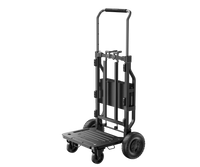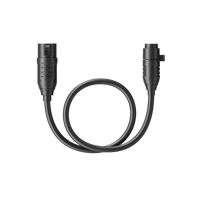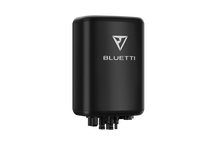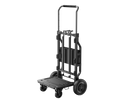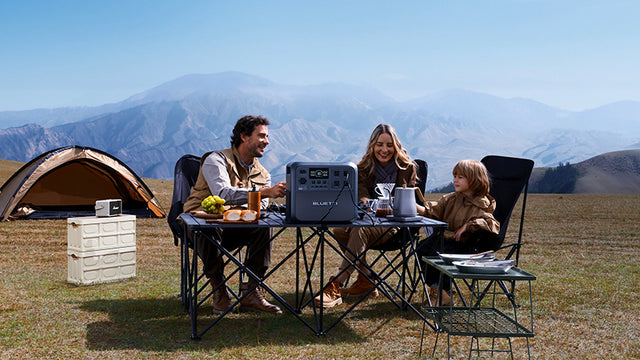Your cart is empty
Shop our productsIf you live in an area where storms are normal, or grid failures are usual in your locality, or you are a camping fan, it's worth buying an alternative energy source. Despite plenty of choices in the market, generators and portable power stations are the primary choices that make customers like you scratch their heads.
In today's age and time, our appliances, devices, and almost everything except humans are powered by electricity, so power failures are a nuisance. Nonetheless, you need alternative and reliable sources such as portable power stations and generator units in the times of power outages. But, what really is it that you should put your faith in: a portable power station or a generator?
The primary function of both the sources is the same: they are emergency power providers and your camping amenities. But they are poles apart in terms of their key aspects. So, to make a well-considered decision and get yourself a better choice, read till the very end and weigh up both options!
What Is A Portable Power Station?

A portable power station is a small and rechargeable battery-powered unit that supplies electrical power necessary for the lights and appliances if there is no AC source.
Most of these power stations usually have several charging ports catering to varied gadgets, including mobile phones, laptop computers, and tablets, as well as AC outlets, which are suitable for powering larger gadgets like refrigerators, cooking apparatuses, electric power tools, and so on. But, how would you charge your power station? Fret not! The portable power stations can be charged with wall outlets, and some models even have the flexibility to charge with solar panels.
How Does Portable Power Stations Work?
A portable power station has a large battery that is akin to a substitute generator but with a compact design and straightforward start and usage. This portable power station employs an inverter that effortlessly converts direct current from the battery into an alternative current to light up your place in the darkness and recharge your devices. And the plus is that with a portable power station, you don't have to agonize over fuse failure.
The startup of power stations is very simple. All you have to do is press the ON button, connect the devices you want to connect, and let it make your life easier to its full potential.
Pros And Cons Of Portable Power Stations
Portable power station being a reliable emergency power source offers different cons. Have a look at them:
Noiseless Operation
Portable power stations are silent operators. These appliances are much quieter when compared to the thunderous engines of generators that would be prohibited in any residential locality or during your outdoor experience, which would dampen the ambiance of that experience.
Eco-friendliness
Power stations gain much attention for their low impact on the environment. As they operate without emitting a single carbon unit, they are green engines supporting environmentally friendly ways.
Portability
The design of portable power stations makes them convenient and easy to move. Light in weight and easy to carry, it is compatible with a wide range of applications.
Now, go through the cons of the portable power station to make yourself fully aware of the product:
Restricted Energy Generation
Batteries are the driving force in portable power stations. The continuous use of one station will drain the battery dry, and long-hour operation is out of the question. But you should also bear in mind that you can always recharge your unit.
Appliance Compatibility
Your station's power capacity determines which devices it can power up. Different models can power up different types of appliances but most of the power stations are unsuitable for driving powerful machines such as air conditioners or big refrigerators.
Battery Deterioration
If not used and maintained, the batteries of a portable power station can degenerate with time. It will greatly reduce its powering quality, capacity, and life.
What Is A Generator And How Does It Work?

Generators are devices that change mechanical or chemically produced energy to electrical power. These are commonly known as internal combustion engines, and they normally operate on fuel like petrol or diesel for energy conversion into useful electricity.
Generally, a generator will utilize laws of electromagnetic induction for electrons' movement and production of electric current. All generators work similarly even though they fall under two main types, namely alternating current generators and direct current generators. In essence, a portable power station stores energy in its battery, whereas a generator generates electricity through fuel.
Types Of Generators
Portable Generator
Compared with large generators, a portable generator is small but useful. These types of generators fueled by natural gas, solar power, and propane are more affordable than whole-house generators. A portable generator can power several small tools and appliances, such as tailgaters, tents, and workshop activities.
Inverter Generator
Inverter generators are different from other types of generators. For instance, the inverter generator changes the engine speed so as to match the electrical requirements instead of running continuously at a fixed rate. Due to this, noise and fuel consumption are significantly decreased. The clean energy produced by inverter generators can be used to charge cell phones, tablets, and laptops. Moreover, it is ideal for traveling, camping, boating, or other outdoor activities.
Solar Generator
Solar generators utilize environmentally friendly solar energy. This is the only generator that could safely work inside as it produces no emissions. Solar generators require minimal maintenance, but they are expensive to buy. Solar generators produce less power compared to other generators. At night, a solar generator can only be relied upon if it comes with a battery of enormous capacity because it is dependent on the sun as a source of power.
Gasoline Generator
Gasoline generators remain one of the outstandingly best options for lower-powered appliances and tools. Gasoline generators are the cheapest in terms of costs, but the overall cost of the gas is higher than other kinds of fuel. Moreover, gas-powered release high emissions and can only be used outside.
Diesel Generator
Diesel generators are well suited for operation in harsh environments such as frigid temperatures. The low burning temperature of diesel puts less strain on the engine, which makes these generators more durable. Compared to gasoline generators, diesel generators are more fuel efficient and cost less in the long term run.
Related articles: Solar vs. Standby Generator: Which Is Right for Your Home?
What Size Generator Do I Need? Tips for Choose the Right Size Generator
What Can I Run with a 2,000 Watt Generator?
Pros And Cons Of Generators
Generators come with numerous pros as well as cons. First, pros are rolled out for you:
Versatility
Generators come into play in varying environments, including households, businesses, office places, and industries. They can be used either outdoors or indoors.
High Power Output
Generators are good for providing sizable energy output to power big appliances such as high-voltage applications. These are designed to cater for heavy electric loads.
Cheap Upfront Cost
Compared to other ways, such as power stations, generators usually have lower initial costs.
Listed down below are the few cons of the generator:
Maintenance
Generators require more maintenance. You will also need to wash it, fill it with oil and fuel, and filter it. This, you should perform repeatedly.
Fuel Dependency
Dependence on fuel remains one of the major disadvantages present in all generators. Fuel must be managed and stored.
Noise And Emissions
One of the most recognized types of loud generators includes emissions. They are not suitable for quiet or eco-friendly areas as they produce engine rumble and release exhaust gasses, respectively.
Portable Power Stations vs. Generators: What Are the Key Differences?
|
Aspect |
Portable Power Station |
Generator |
|
Decibel level |
Quieter and perfect for both indoor and outdoor applications |
Generally have noisy operations |
|
Mobility Factor |
Featherweight and petite design enhance the portability of the power stations |
Large size and heavyweight limit mobility of generators, but may have wheels |
|
Power Source |
Run by batteries and can be powered by solar panels |
Powered by various combustion fuels like gas, diesel, or propane |
|
Cost |
Affordable in terms of initial cost |
Tend to be expensive upfront due to the latest technology and extra features |
|
Fuel Cost |
As long as the battery works well, there is no fuel cost. Plus, solar energy is obviously free of cost. |
Depends on the ongoing fuel cost. It could be pricey. |
|
Exhaust |
Instrumental in polluting the environment because of the exhaust gasses. |
Eco-friendly as power stations emit no polluting gases. |
|
Upkeep |
Not much of a maintenance, just battery checks and occasional firmware updates. |
Regular oil change is required |
Is A Portable Power Station Better Than A Generator?
It's like choosing a sidekick. It's a matter of the kind of superpower that fits your energy type. It depends on the gig. For this purpose, you must go for generators when planning for major energy parties. They will make a boss of that heavy lifting! However, if you love the go-to scene –camping, adventure, or simply charging your devices when away—the Portable Power Station blows away the rest.
It is a choice and depends on one's preference, the purpose to be addressed, and the amount of money available. Nevertheless, a portable power station is the most appropriate investment for you if efficiency and mobility are what you need from a power supply.
Let's take you to the right choices in portable power stations:

Try the BLUETTI AC60P if you've been around here a while. Considering that it is rated IP65 for water-and-dust resilience, we are almost talking about weatherproofing. However, it works at only about 45 dB — a quiet library level. It comes in an expandable package. In addition, it features a sturdy casing that's made out of aluminum. The battery? The first-of-its-kind durable LiFePO4 superhero that lasts more than ten years, baby, that is IP65 rated and laughs off water and dust. It is an everyday power friend that weighs only 20.06 pounds. Want to get power for your hair dryer or devices? No sweat. BLUETTI provides you with seven outputs. Power play, anytime, anywhere!

BLUETTI EB70S portable power station is a genius mix of innovativeness and excellent technology. This is your ideal backup solution that packs an 800W / 1000W inverter together with a 716Wh lithium iron phosphate (LiFePO4) battery for road trips or unplanned blackouts. Picture this: LED, and you have got yourself a moving theater complete with fans, projectors etc. It would help if you charged a bunch of gadgets?Don't worry; it covers you with 12 output ports. A wireless charging pad is also placed on top of it for your phone. It's your camping buddy and emergency companion! It has a smart handle for lifting and carrying it in one hand. Your road essentials, power on, worry off!

Pocket-sized power beast, BLUETTI EB55. Compact, lightweight, and battle-ready for you when exploring in your campervan or camping excursion. This is no play; it's a serious game because this beast can play with up to thirteen devices! Picture this: Everything that you can imagine, ranging from smartphones and mini-fridges. And guess what? To make life easy, there's a wireless charging pad along the way. It's only 16.5 lbs, there is a handy handle; it's your go-anywhere power pal – recharge options? You can plug into a standard outlet, a generator outlet, a car outlet, and, using solar panels, absorb energy from the sun. Outdoor warriors, EB55 has a 537Wh battery plus a 700W inverter, and you are the powerhouse.
Final Thoughts
Always think thoroughly about the amount of power you need, the usage for which it is intended, the money at your disposal, and what exactly you want. Check if your emphasis is placed on high power output, fuel efficiency, clean power for sensitive electronics, or environmental friendliness. By taking into consideration all of these factors, you could select an ideal power supply best suited for your specific application and add comfort to your life.
Shop products from this article
You May Also Like

What Does a 30% Federal Solar Tax Credit Mean and How to Apply?
Governments around the world are offering programs that encourage homeowners to switch to solar energy. Among the most notable programs is the 30% Federal Solar Tax Credit. It reduces your...

Deadly Flooding Devastates U.S. South and Midwest — What You Need to Know





































































